If you’re a guinea pig owner, you may be wondering if it’s safe for your furry friend to have romaine lettuce as a daily part of their diet. While romaine lettuce can be a healthy addition to their meals, it’s important to understand their dietary needs and potential risks associated with feeding it to them everyday.
Key Takeaways:
- Romaine lettuce can be safely included in a guinea pig’s diet but in moderation
- It’s important to provide a well-rounded diet with a variety of suitable greens
- Consult with a veterinarian for personalized advice and guidance on your guinea pig’s diet
- Be aware of signs of allergies or digestive issues and feed romaine lettuce according to their toleration level
- Understanding your guinea pig’s dietary needs is crucial for maintaining their health and happiness
Guinea Pig Dietary Needs
Guinea pigs are herbivores, which means their diet primarily consists of plants and vegetables. To ensure their health and well-being, it’s important to provide them with a diverse range of foods that meet their nutritional needs.
The key elements of a healthy guinea pig diet include:
- Hay: Timothy hay should make up the majority of your guinea pig’s diet. It’s an excellent source of fiber and promotes good dental health.
- Pellets: High-quality pellets specifically formulated for guinea pigs should be given in limited quantities as a source of additional nutrients.
- Vegetables: A variety of fresh vegetables should be given daily, including leafy greens like romaine lettuce, along with other veggies like carrots, bell peppers, and cucumber.
- Fruit: While fruit should only be given in moderation, small amounts of strawberries, kiwi, and other fruits can provide essential vitamins.
- Water: Clean, fresh water should always be available to your guinea pig.
As with any animal’s diet, it’s important to maintain moderation and balance in your guinea pig’s food intake. Overfeeding or providing too much of one type of food can lead to health issues.
Nutritional Value of Romaine Lettuce
Romaine lettuce is a nutritious vegetable that can benefit guinea pigs when included in their diet in moderation. This leafy green contains essential nutrients such as Vitamin C, Vitamin K, Folate, and fiber.
Vitamin C is crucial for guinea pigs, as they cannot produce it themselves. Romaine lettuce is an excellent source of Vitamin C, which supports a healthy immune system and promotes wound healing. One cup of chopped romaine lettuce contains approximately 8% of the daily requirement of Vitamin C for guinea pigs.
Vitamin K is necessary for blood clotting and strong bones. Romaine lettuce is a good source of Vitamin K, with one cup providing around 60% of the daily requirement for guinea pigs. Folate also plays a role in healthy bone development, and one cup of romaine lettuce contains around 16% of the daily requirement.
Finally, fiber is essential for a guinea pig’s digestive health. Romaine lettuce contains both soluble and insoluble fiber, which can aid digestion and prevent constipation. One cup of romaine lettuce provides approximately 1 gram of fiber, making it a beneficial addition to a guinea pig’s diet.
While romaine lettuce does contain several nutrients necessary for guinea pigs, it should not be the sole source of their nutrition. A balanced diet including other vegetables, hay, and pellets is important for their overall well-being.
Benefits of Romaine Lettuce for Guinea Pigs
Romaine lettuce is a valuable addition to a guinea pig’s diet, offering several benefits. Firstly, it’s a great source of vitamin C, essential for the health of guinea pigs. Unlike humans, guinea pigs cannot produce their own vitamin C, making it crucial to include in their diet. One cup of romaine lettuce contains over 100% of the recommended daily intake of vitamin C for a guinea pig.
Secondly, romaine lettuce is low in calories and high in fiber, promoting healthy digestion in guinea pigs. The high water content in romaine lettuce can also help keep your furry friend hydrated.
Lastly, romaine lettuce provides a variety and texture to a guinea pig’s diet, helping to prevent boredom and encourage foraging behavior. It is always best to include various vegetables in a guinea pig’s diet to ensure that they receive all the essential nutrients.
It is important to note that while romaine lettuce offers several benefits, it should still only be fed to guinea pigs in moderation.
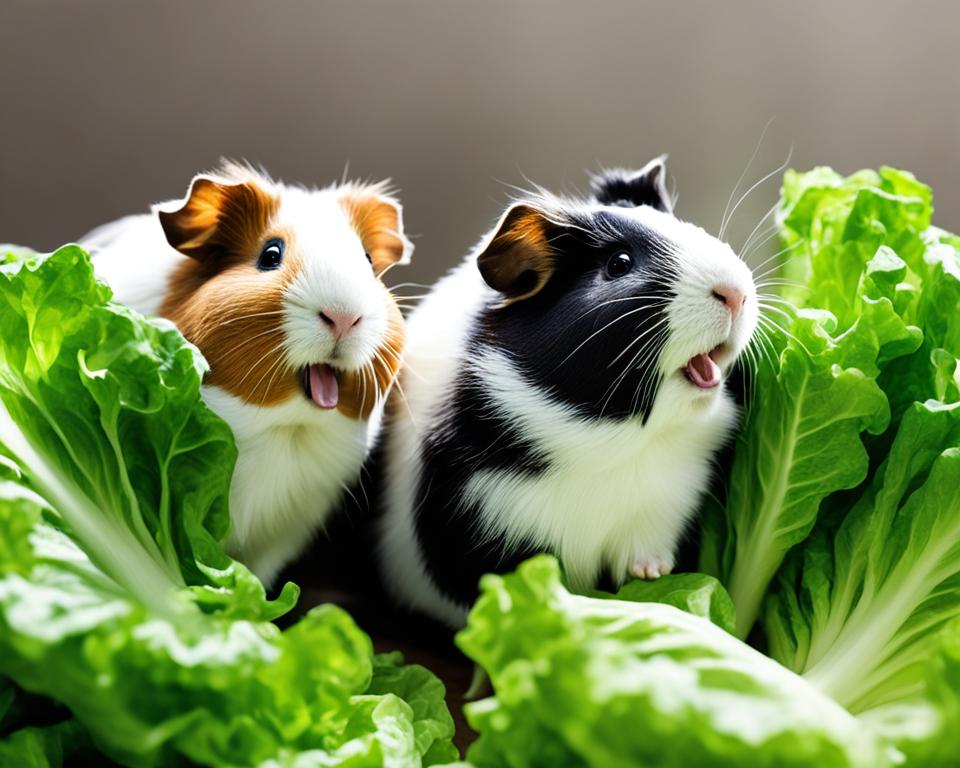
Potential Risks of Feeding Romaine Lettuce Everyday
While romaine lettuce is a healthy and nutritious food for guinea pigs, feeding it to them every day may pose some risks. One of the main risks is that romaine lettuce has a high water content, which can lead to diarrhea and other digestive issues if consumed excessively. This can be especially problematic for younger guinea pigs and those with sensitive stomachs.
In addition, romaine lettuce has a moderate amount of calcium, and too much calcium in a guinea pig’s diet can lead to bladder stones, a painful and serious condition that can require surgery to treat. Therefore, it’s important to ensure that your guinea pig gets enough fiber to balance the calcium levels in their body.
Another risk associated with feeding romaine lettuce every day is the possibility of contamination. Although rare, there have been instances where romaine lettuce has been contaminated with E. coli or other harmful bacteria, which can be hazardous to both humans and pets.
To minimize these risks, it’s recommended that romaine lettuce is fed to guinea pigs in moderation. It’s also important to thoroughly wash and dry the lettuce before serving it to your pet and to purchase it from a reputable source.
In the next section, we will discuss the importance of moderation when it comes to incorporating romaine lettuce in your guinea pig’s diet.
Moderation is Key
While romaine lettuce can be a valuable addition to a guinea pig’s diet, it’s important to exercise moderation. Too much of any food can cause digestive issues and other health problems, so it’s best to provide romaine lettuce in recommended serving sizes and frequency.
The recommended serving size for romaine lettuce is one to two cups per guinea pig, per week. This should be spread out over several days to avoid overloading their digestive systems. It’s also important to wash the lettuce thoroughly and remove any parts that may be tough or hard to digest.
Feeding romaine lettuce every day in large quantities can cause diarrhea, gas, and other digestive problems in guinea pigs. Additionally, it’s important to remember that romaine lettuce should not be the only green vegetable in their diet. Providing variety in their diet is key to ensuring that they get all the nutrients they need.
Overall, moderation is key when it comes to incorporating romaine lettuce into your guinea pig’s diet. By providing it in recommended amounts and alongside other suitable greens, you can ensure that your furry friend stays healthy and happy.
Other Suitable Greens for Guinea Pigs
While romaine lettuce is a great addition to a guinea pig’s diet, it is important to offer variety and other suitable greens as well.
Here are some greens that are safe and appropriate for guinea pigs:
- Spinach
- Kale
- Arugula
- Cilantro
- Parsley
- Bell peppers
- Cabbage
Remember to serve these greens in moderation and avoid offering them all at once, as too much variety at once may upset your guinea pig’s digestive system.
Signs of Allergies or Digestive Issues
While romaine lettuce can be a healthy addition to your guinea pig’s diet, it’s important to monitor them for any signs of allergies or digestive issues. Even if your guinea pig has been tolerating romaine lettuce well in the past, they can develop sensitivities over time.
Some signs to watch out for include:
- Diarrhea or changes in stool consistency and frequency
- Lack of appetite or reduced food intake
- Weight loss or lethargy
- Excessive gas or bloating
- Signs of discomfort, such as teeth grinding or hunching
If your guinea pig is experiencing any of these symptoms, it’s vital to remove romaine lettuce from their diet and consult with a veterinarian. They can help you determine the root cause of the issue and recommend a suitable course of treatment.
Being attentive to your guinea pig’s eating habits and overall well-being is key to ensuring their health and happiness. By promptly addressing any signs of allergies or digestive issues, you can help keep your furry friend feeling their best.
Balancing a Guinea Pig’s Diet
Just as it is for humans, maintaining a balanced diet is crucial for the overall health of guinea pigs. A balanced diet for guinea pigs should consist of:
- Hay: Guinea pigs should have constant access to hay, as it helps with digestion and maintains good dental health.
- Pellets: Pellets that are specifically formulated for guinea pigs should be given daily, but in moderation as they are high in calories.
- Vegetables: Fresh vegetables, such as romaine lettuce, should be given daily to provide essential vitamins and minerals.
- Fruits: Fruits, while a tasty treat, should be given in small quantities due to their high sugar content.
It is important to balance the amount of each component in their diet. A good rule of thumb is to offer 80% hay, 15% vegetables, and 5% pellets and fruits.
Remember to introduce new foods in small amounts to prevent digestive issues. If you have any concerns regarding their diet, consult a veterinarian who specializes in small animals for personalized advice.
Consulting a Veterinarian
If you have any specific concerns about your guinea pig’s diet or want personalized advice, it’s always best to consult a veterinarian who specializes in small animals.
A consulting veterinarian will be able to evaluate your guinea pig’s dietary concerns and provide actionable recommendations that meet their unique needs. They can also help you determine the appropriate serving sizes and frequency of romaine lettuce or other suitable greens for your guinea pig.
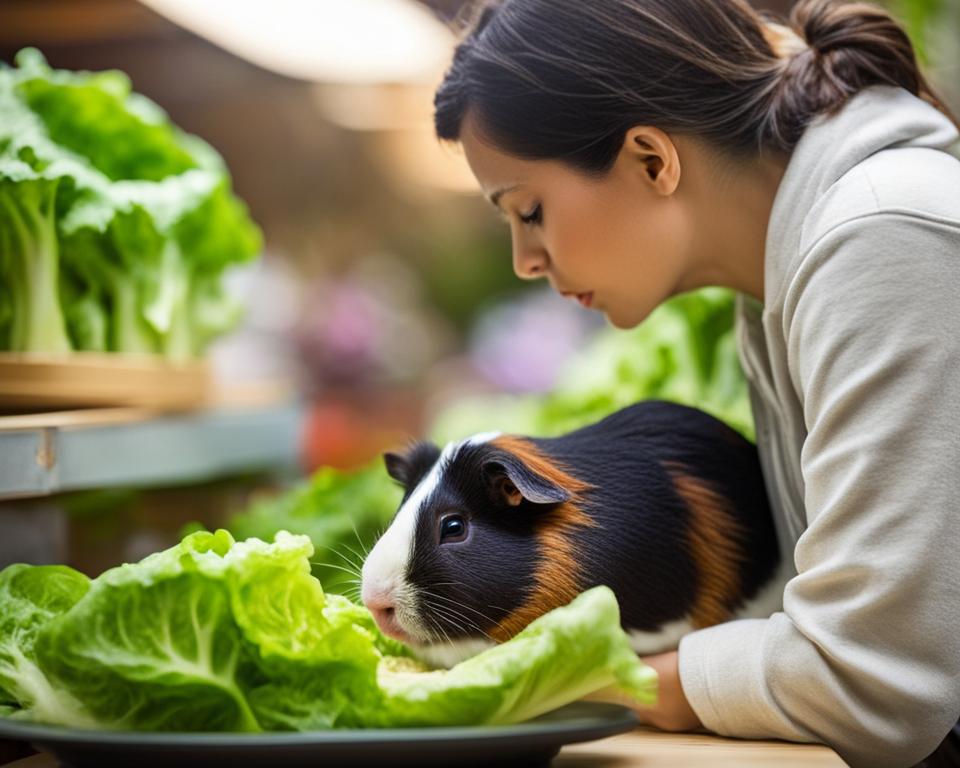
Don’t hesitate to seek professional advice if you have questions or concerns about your pet’s nutrition. A healthy and balanced diet is crucial for your guinea pig’s well-being, and a consulting veterinarian can provide valuable guidance to ensure they are getting the nutrients they need.
Conclusion
In conclusion, romaine lettuce can be a safe and beneficial part of a guinea pig’s diet, but it is important to feed it in moderation. It is crucial to understand the dietary needs of guinea pigs to ensure a well-rounded and healthy diet. Providing variety in their diet with other suitable greens is recommended. It’s important to monitor for signs of allergies or digestive issues when introducing new foods to your guinea pig’s diet. If you have any concerns about your guinea pig’s diet, consult a veterinarian who specializes in small animals. By keeping a balanced diet and being aware of any potential risks, you can ensure your furry friend’s health and happiness.
FAQ
Can guinea pigs eat romaine lettuce every day?
While romaine lettuce is safe for guinea pigs, it should not be the sole component of their diet. It should be offered in moderation as part of a varied and balanced diet.
What are the dietary needs of guinea pigs?
Guinea pigs require a diet rich in hay, fresh vegetables, and a small amount of pellets. They also need a constant supply of clean water.
What is the nutritional value of romaine lettuce?
Romaine lettuce is low in calories and high in fiber, vitamins A and C, and minerals such as calcium and potassium. It can provide valuable nutrition to guinea pigs.
What are the benefits of feeding romaine lettuce to guinea pigs?
Romaine lettuce can contribute to a guinea pig’s overall health by providing hydration, aiding digestion, and enhancing their immune system.
Are there any risks associated with feeding romaine lettuce every day?
Feeding romaine lettuce every day can lead to an imbalance in a guinea pig’s diet. It’s important to provide a variety of vegetables and greens to ensure they receive all the necessary nutrients.
How much romaine lettuce should I feed my guinea pig?
A good rule of thumb is to offer about 1-2 cups of fresh romaine lettuce per guinea pig per day. However, it’s essential to monitor their intake and adjust accordingly based on their individual needs.
What other greens are suitable for guinea pigs?
Alongside romaine lettuce, other suitable greens for guinea pigs include kale, spinach, cilantro, and parsley. It’s important to introduce new greens gradually to prevent digestive upset.
What are the signs of allergies or digestive issues in guinea pigs?
Signs of allergies or digestive issues may include diarrhea, bloating, loss of appetite, or changes in behavior. If you notice any of these signs, consult a veterinarian promptly.
How can I balance my guinea pig’s diet?
To achieve a balanced diet for your guinea pig, offer a variety of fresh vegetables, limited pellets, and a constant supply of high-quality hay. Consult a veterinarian for specific dietary recommendations.
Should I consult a veterinarian regarding my guinea pig’s diet?
Yes, it is always advisable to consult a veterinarian specializing in small animals for personalized advice and guidance on your guinea pig’s dietary needs and concerns.

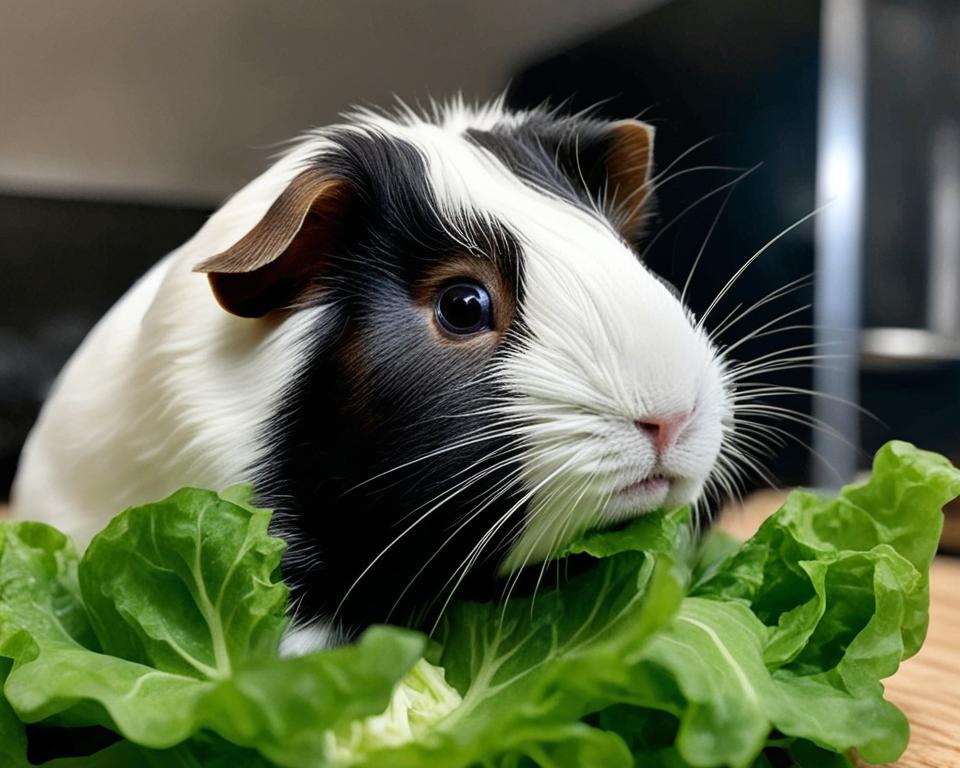
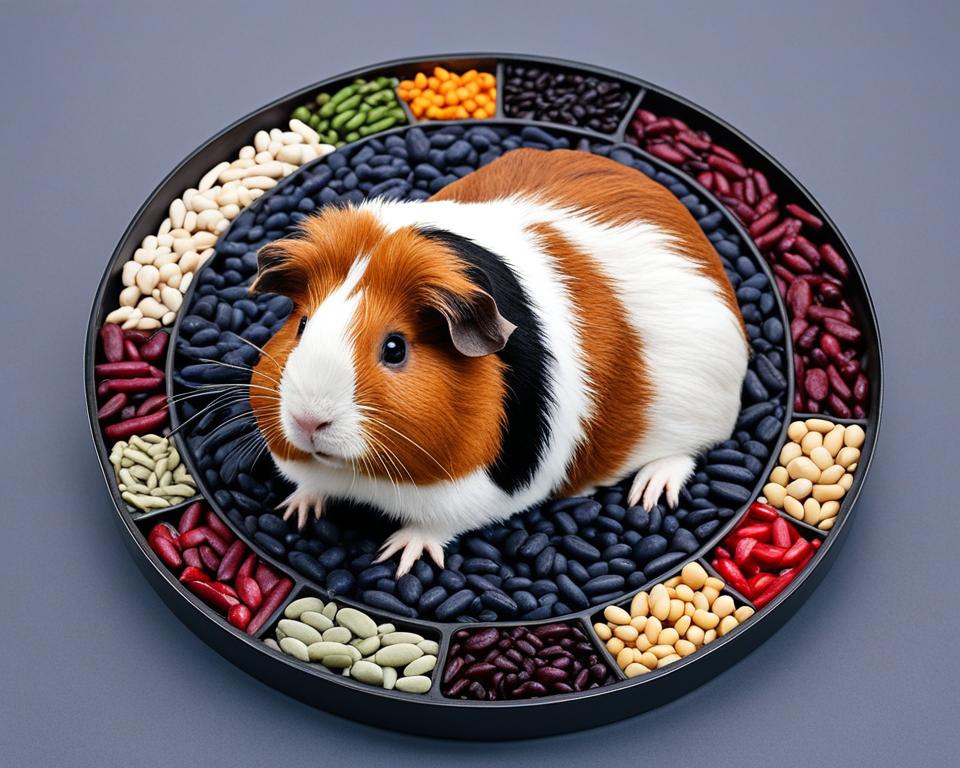
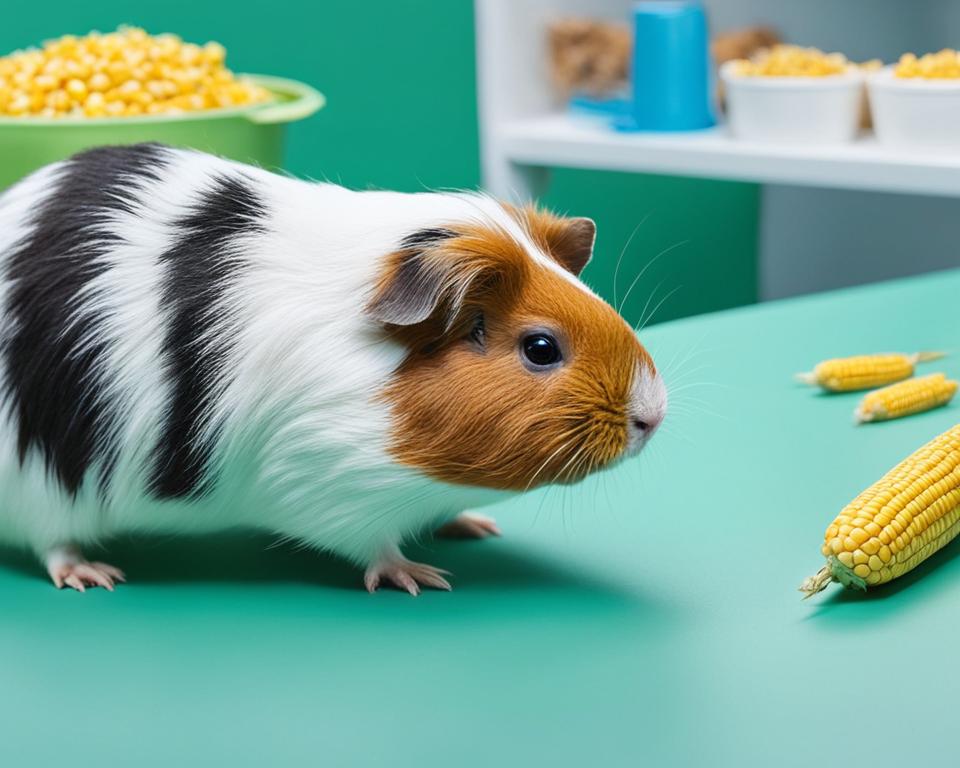
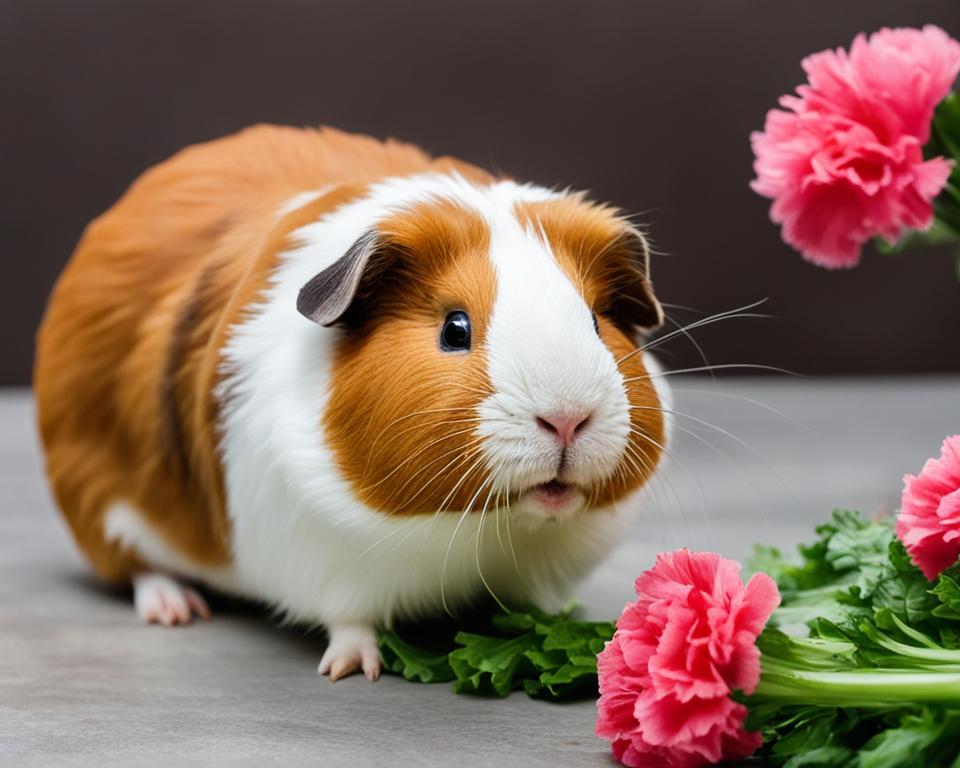
Leave a Reply